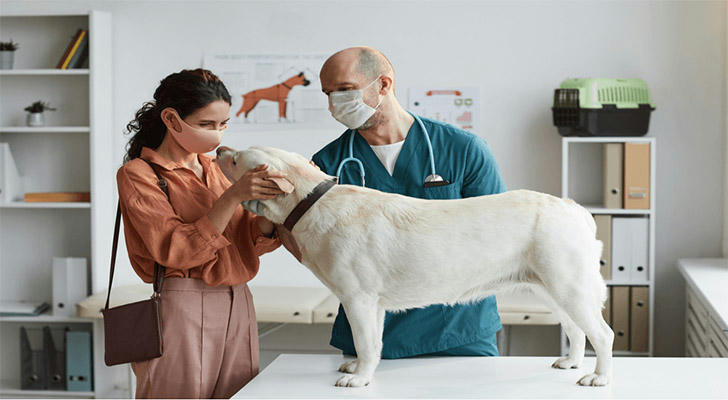How to Find Free Pet Vaccinations and Health Checkups

Keeping your pet healthy is important, and regular vaccinations and checkups are a big part of that. Vaccinations protect pets from serious diseases, and checkups help catch health problems early. However, many pet owners worry about the costs of these services. The good news is that there are many free or low-cost options available that can help keep your pet healthy without breaking the bank.
Basic Information About Pet Vaccinations and Health Checkups
1. Common Pet Vaccines:
• Rabies Vaccine: Required by law and protects against the deadly rabies virus.
• Distemper Vaccine (for dogs): Protects dogs from a serious and often fatal virus.
• Parvovirus Vaccine (for dogs): Prevents a dangerous virus that affects a dog’s intestines.
• Feline Viral Rhinotracheitis Vaccine (for cats): Helps protect against upper respiratory infections.
• Feline Leukemia Virus Vaccine (for cats): Important for outdoor cats, this vaccine protects against a contagious virus.
2. What Happens During a Health Checkup:
• Weight Check: The vet checks if your pet is at a healthy weight to avoid problems like obesity or being underweight.
• Teeth and Mouth Check: The vet looks for dental issues like gum disease or tooth decay.
• Skin and Fur Check: The vet checks for skin conditions or parasites like fleas and ticks.
• Eye and Ear Check: They look for signs of infections or problems like ear mites.
• Heart and Lung Check: The vet listens to your pet’s heart and lungs to make sure everything sounds normal.
• Blood Tests: These can help detect problems with organs like the liver or kidneys before they become serious.

3. How Often Should Pets Get Vaccinated and Checked?
• Puppies and Kittens: Need several rounds of vaccinations starting from a young age.
• Adult Pets: Typically need yearly booster shots and annual health checkups.
• Senior Pets: May need more frequent checkups to catch age-related issues early.
How to Find Free or Low-Cost Vaccinations and Health Checkups
1. Animal Shelters and Rescue Groups: Many animal shelters and rescue organizations offer free or low-cost vaccinations and health checks. These services are often provided to pets that have been adopted or for families who may not be able to afford regular vet care.
2. Community Events and Pet Health Days: Some cities or organizations host free community events where pets can get vaccinated and checked. Keep an eye out for announcements in your area, as these events are often advertised on social media or through local news.
3. Non-Profit Organizations: Groups like the Humane Society or Petsmart Charities often provide free or low-cost care, including vaccines, spay/neuter services, and checkups, especially for families in need.
4. Pet Care Schools: Veterinary schools or training programs sometimes offer low-cost or even free services. These services are performed by students under the supervision of licensed veterinarians. It's a great way to get professional care at a reduced cost.
5. Government-Supported Pet Care Programs: In some cities or states, the local government offers free or reduced-cost pet care for low-income families. This can include vaccinations, spay/neuter programs, and routine checkups. Check with your local animal control or welfare office to see what’s available.
6. Online Resources and Community Apps: Websites like Nextdoor and Petfinder can help you find local events and services for free or low-cost pet care. You can also join community groups on social media to stay updated on any free services in your area.
7. Mobile Clinics: Some cities have mobile vet clinics that travel to different neighborhoods offering free or cheap vaccinations and basic health care. These clinics are a convenient way to get your pet seen without having to travel far.

Government-Supported Pet Care Programs
Many local governments offer programs to help low-income families or those facing financial difficulties provide essential care for their pets. These programs often focus on preventing the spread of disease and controlling pet populations through spay/neuter services. Here are some common types of government-supported pet care programs:
1. Free or Low-Cost Vaccination Clinics:
Many cities and counties partner with local shelters or veterinary clinics to offer free or discounted vaccinations. These clinics may focus on rabies vaccinations but often provide a variety of core vaccines to help keep pets healthy. You can find these services by checking your local government or animal control website.
2. Spay/Neuter Programs:
Government-funded programs to provide free or low-cost spay/neuter services are common in many areas. These services help control the pet population and reduce the number of stray animals. Some programs even offer transportation to and from the clinic for pet owners who can’t easily access these services.
3. Pet Health Days and Community Events:
Local governments often host community pet health days that offer free health checkups, vaccinations, and advice on pet care. These events aim to educate pet owners and provide services to those who might not otherwise be able to afford regular veterinary care.
4. Financial Assistance for Emergency Care:
Some local governments offer emergency pet care assistance for low-income households. This can help cover the cost of urgent medical treatments, surgeries, or medications that might otherwise be unaffordable. These programs usually require proof of financial need and may be available through partnerships with local vet clinics.
5. Trap-Neuter-Return (TNR) Programs:
Many governments support TNR programs for managing feral cat populations. This involves humanely trapping stray cats, neutering or spaying them, vaccinating them, and then returning them to their original location. These programs help prevent overpopulation and improve the health of feral cats.
Other Free or Low-Cost Pet Care Resources
1. Pet Food Banks: If you’re struggling to afford pet food, many areas have pet food banks where you can get free food for your pets. These are often run by shelters or non-profit organizations.
2. Volunteers and Foster Care: Some volunteer groups offer free temporary pet care, including feeding and basic grooming, for pet owners who need short-term assistance.
3. DIY Pet Care Tips: You can save money by learning to do some basic pet care at home, like brushing your pet’s teeth, cleaning their ears, and trimming their nails. There are many online tutorials that can guide you step by step.
Conclusion
Taking advantage of free or low-cost pet care services is a great way to keep your pet healthy without the financial stress. These resources help prevent diseases and catch health problems early. We encourage all pet owners to explore local and online options, including government-supported programs, to provide the best care for their pets, no matter their budget.
